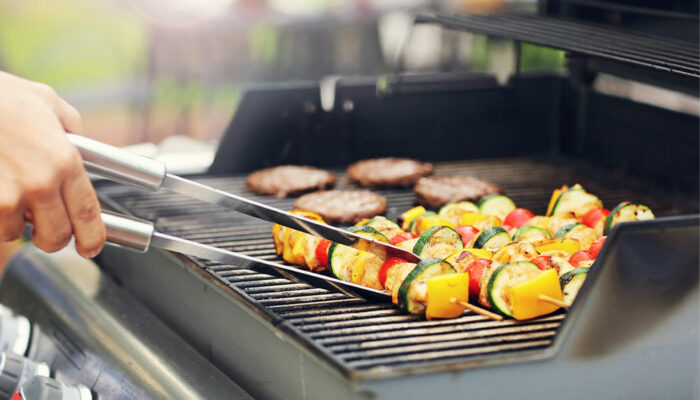9 common errors to avoid when grilling

Most people enjoy grilling for special occasions or even as a hobby. But as popular as grilling might be, the BBQ grill isn’t one that you use every day. So you might make a few mistakes that might impact the griller. It could also hamper the quality of the food being cooked. And no one enjoys munching on completely burnt meat. Therefore, here are nine errors that you should avoid when using a griller.
Not cleaning the grill
Like any appliance at home, a grill requires frequent cleaning, especially after use. Since you are cooking food on the grill, foodborne germs may attach themselves to any leftovers on the grill. These could spread indoors or outdoors and lead to people getting sick. Furthermore, any leftover pieces of charred meat could make fresh food taste weird. Therefore, it is important to clean the griller after each use. You could wash the grates and prep surfaces with soapy, hot water before firing up the grill. It is also important to clean the spatulas, tongs, and other utensils used in grilling.
Forgetting to oil the grill
Besides cleaning the grill, it is also important to oil it before you cook something. Steaks and other firm proteins might be unaffected by the lack of oil. But if fish, fruit, and vegetables are on the flame, the lack of oil could cause them to stick to the grill. Ensure that you rub a light coat of vegetable oil over the unlit grill with paper towels, as this would help avoid a sticky catastrophe.
Applying the sauce early
This is a common mistake people tend to make when grilling meat. This can result in the sauce burning quickly and becoming sticky and unpleasant. Instead, it’s recommended to brush a light layer of sauce on the food toward the end of the cooking process while it’s on the cooler side of the grill. Alternatively, you can wait until the meat is fully cooked and off the grill before applying any sauces.
Neglecting the grill brush
Grill brushes are reliable tools for removing charred residue from grates. However, if you use a wired brush, you should be mindful of its bristles. These usually fall off after some time and could get stuck to the food. Therefore, after cleaning the grill with the brush, you should use a wet paper towel or cloth to wipe off loose bristles. A tried and tested method to prevent the bristles is to use an alternative cleaning tool, such as balled-up pieces of aluminum foil to scrub the grates. If the BBQ grill has cooled down, hold the foil ball and scrub. On the other hand, if the grill is hot, you can use a pair of tongs to move the foil ball around.
Not separating raw and cooked foods
One of the worst mistakes people could make while using a grill is not segregating raw and cooked foods. You should not let fresh foods like vegetables and fruits come into contact with raw meats, marinades, or meat juices. Furthermore, wash your hands with soap and water before grilling and after handling raw meats. This is because uncooked meat, such as seafood and poultry, might be contaminated with bacteria, such as E. coli and salmonella. Moreover, avoid using the same utensils and plates that may have come in contact with raw meats when serving food.
Failing to refrigerate raw food on time
Whether you have raw poultry or seafood, it is important to keep them refrigerated below 40 degrees Fahrenheit, especially if you will not grill them immediately. If you keep them out for long periods, the germs on them may multiply once the temperature rises above 40 degrees. And this could spoil the meat. Furthermore, any leftovers should be frozen or refrigerated within two hours of cooking them. Also, if you grill these foods on a hot day, and the temperature outdoors is above 90 degrees Fahrenheit, you should refrigerate the foods within one hour after cooking.
Charring meats
Eating charred meat can be enjoyable for some, but it can also have negative effects on your health if consumed in excess. High heat or smoke used to prepare muscle meat like pork, beef, poultry, and fish can increase the risk of cancer due to the formation of harmful chemicals. This occurs when substances in the meat react with smoke, heat, and flames. To avoid this, it’s best to avoid prolonged cooking at high temperatures or to pre-cook the meat in a microwave before grilling. For added safety, it’s recommended to turn the meat when grilling and remove any charred portions before consuming.
Not using a thermometer
Whether you’re a beginner or an expert at grilling, it’s always wise to use a thermometer. This simple step can guarantee that your meat is cooked to the ideal and safe internal temperature. If you do not use a thermometer, there might be a chance of potentially harmful germs getting into your system, which could lead to diseases and infections. Furthermore, since vegetables cook faster than meats, you should cook them on separate skewers to ensure the meat isn’t accidentally left undercooked.
Buying inferior grills
Another common error that people make when grilling is purchasing an inferior grill. While several manufacturers might sell these products for a much lower and more attractive price, the materials used might not be of good quality. As a result, the griller might not be capable of cooking the food as well as it should. The components in the cheaper grill might also spoil faster and cost you much more to repair or replace in the long haul. So, while a grill may cost more, you should consider investing in it for the best BBQ experience.





